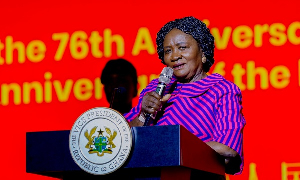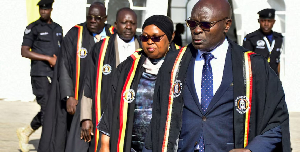“I brought you into a fertile land to eat its fruit and rich produce. But you came and defiled my land and made my inheritance detestable.” Jeremiah 2:7
You must be living under a rock not to have seen the scale of destruction galamsey has visited in Ghana. The recent videos and pictures circulating that show the massive scale of environmental destruction caused by illegal mining (galamsey) in Ghana are a sobering testament to the colossal failure of this generation—my generation, our generation.
The devastation is not just an environmental disaster but also a moral failure. I deliberately chose "tabernacle" to describe what we are losing. In biblical terms, a tabernacle is more than a sacred space—it signifies the presence of God among a people, a link to the divine, a place that demands respect, protection, and even sacrifice. Many tribes and towns in Ghana have a sacred place in their culture. The Churches have their Tabernacles as a place of sanctity and reverence. The irreversible loss of these tabernacles is a tragedy we must all bear.
I suggest that our rivers and forests are modern-day tabernacles. They are gifts from nature that embody the presence of the divine among us. They represent life, sustenance, and spiritual connection and should be revered as such. Yet, we have stood by, often in silence, as fellow citizens and foreigners, enabled by the tacit collusion of some of our own, have ravaged these natural sanctuaries.
I remember growing up in my village. The local river had a priest who protected it. There were days you could not wash in the river. Talks of other river gods abound across Ghana. That was how much our forebears revered nature. I am sure the missionaries probably saw such beliefs as idol worship. Now you know the importance of this kind of belief.
The current destruction is not just an ecological issue but a spiritual one. By allowing illegal miners to decimate our rivers, forests, and lands, we have essentially permitted the desecration of our sacred spaces.
Our forests and rivers are not just economic resources to be exploited but symbols of the divine that should be cherished and preserved for future generations.
Allowing or trespassing on the forest reserves, mainly, should be considered as sacrilegious acts. They violate the sanctity of those Tabernacles. But we, as a collective, can change this narrative. We can protect our tabernacles, our rivers, and our forests. We can preserve our heritage for our children and their children.
The sad reality is that we, as a people, have failed to protect these tabernacles. We have been unable to safeguard the things that symbolize the very presence of God within our land. While we may not all be directly involved in the destruction, our collective apathy and inaction make us complicit.
Those with the moral courage to speak out are doing the right thing. We may not agree on some of their methods, but those who speak out have their hearts in the right place, and we indeed owe them a debt of gratitude. We are witnesses to the ongoing devastation, and that very act of witnessing without action makes us bearers of responsibility.
As a nation, we must hang our heads in shame. Not only have we failed the generations before us, who nurtured these lands and passed them on to us as stewards, but we have also failed the generations to come.
The rivers that once ran clear, the forests that once provided food and sanctuary, the rivers that once provided our drinking water and fish for food and sustenance, are being destroyed forever, and with them, a piece of our national soul. Yet we stand by as mere spectators to this environmental catastrophe.
Both ex-President Mahama and Vice President Bawumia, the two major contenders of this year's election, have offered only lukewarm responses to the ongoing assault and destruction of our sacred Tabernacles. Instead of addressing the issue with the urgency and conviction it demands, they have shown a disappointing lack of moral clarity.
Rather than taking a courageous stand, they appear more concerned with political expediency. In times like these, it’s not about safeguarding votes or doing what is convenient; it’s about standing on the side of what is right, even if it means risking political support. Authentic leadership calls for moral integrity, not compromise.
President Akufo-Addo, for his part, appears to have given up entirely on this issue. Witnessing such inaction from someone in his position of authority is disheartening. I sincerely hope I am mistaken in this assessment, but his lack of decisive response suggests a troubling indifference.
Leadership should not waver in the face of critical challenges, and I hope the President will soon prove otherwise by taking meaningful action in the few months he has left in office. Here, the words of the late President Mandela ring true: “It's never too late to do what is right.”
The nation must declare a state of emergency on the galamsey crisis. This illegal mining activity has reached such critical levels that it threatens the foundations of our existence in many ways.
It is time for a national summit to unite traditional leaders, government officials, civil society organizations, and environmental experts. Such a meeting is crucial to publicly recognize the gravity of the issue and commit to a united and comprehensive strategy. Extraordinary times call for extraordinary measures.
Galamsey will continue undermining the nation's environmental health and sustainable development goals without a coordinated national effort.
A multifaceted approach is required to combat the fundamental causes of galamsey. This must include addressing the pervasive poverty that drives many into illegal mining as a means of survival. Economic hardship is a key motivator, and the cycle will continue unless alternative livelihoods are provided.
Greed, too, perpetuates these activities, as some individuals, including businesspeople and politicians, exploit the nation's resources for personal gain, often at the expense of the greater good.
There is a troubling disregard for laws, customs, and traditions—values that once guided the use and protection of our lands and resources. Law enforcement agencies must be reinforced to ensure that our laws are respected. Those charged with enforcing the law must not pervert it for selfish gains. There seems to be too much of that in Ghana.
Finally, our leaders, many of whom are in the twilight of their careers and lives, must recognize the pressing need for urgency in their actions. The most profound legacy they can leave for future generations is the careful stewardship of the natural resources they were entrusted with.
Leadership, at its core, is about safeguarding the well-being of the people and ensuring that future generations can build on a solid foundation, not one eroded by selfishness, negligence, apathy, or complacency. The rebuilding of the Tabernacles must start now, not next year.
Opinions of Wednesday, 23 October 2024
Columnist: Henry Adobor















